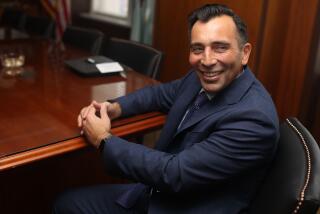ETHICS / OPPORTUNITY FOR CHANGE : Crisis of Confidence Has a Silver Lining : Scandals have fueled reform efforts that could make public service a worthy goal again.
It’s hard to say whether we’ve already braved the worst of Hurricane Ethics, or if it has only just begun. Regardless, the storm will end. While it’s sometimes hard to believe in all the tumult, calm will return to the process of governance. The aftermath of the current ethics frenzy could be a renaissance in government where the spirit of democracy is renewed and the highest principles of public service prevail.
Naive romanticism you say? We think not. In fact, the changes already taking place at every level of government are significant and are happening at an unprecedented speed. What’s happening in this country is a cleansing process, albeit by sand blasting. The ethics movement is a catalyst of evolution, renewal, advancement, betterment and unusual opportunity.
The enormous publicity and resulting outpouring of public rage at such disasters as the savings-and-loan scandal is doing most effectively what laws have not been able to do. Specifically, the so-called Keating Five scandal has revamped attitudes and political behavior more than the old laws have done or new ones will.
This scandal has opened up the relationship between a politician’s informal actions and their financial support to much closer scrutiny. A green light to pursue similar “influence” stories is flashing in newsrooms all over the country. Many politicians realize it is not enough to modify their future behavior, which is most assuredly happening. They also are concerned with what they may have already done--acts, which like hidden land mines, can explode at unexpected times for unexpected reasons.
The revelations coming from the Keating scandal have stripped away the veneer of legitimacy to a form of “constituency service” that is and always has been inconsistent with principles of representative democracy. In its wake, politicians can no longer blind themselves to the corrupting intent of their contributors and feel satisfied that they have upheld the honor of their office so long as there was no quid pro quo. Some politicians are saying no, others are being much more selective in the issues and persons they advocate, and all are being much more cautious.
In California, an FBI sting operation, a recent state poll and the conviction of state Sen. Joseph Montoya have left a lot of legislative employees feeling insecure. But more than that, it has motivated an unprecedented attempt to enact some basic rules designed to eliminate many sources of improper influence and restore public confidence (a Los Angeles Times poll showed that 67% of Californians believed most state legislators were financially corrupt; and for Congress, in a New York Times/CBS poll, 40% said at least half were financially corrupt).
While the bills recently passed by the Assembly and state Senate have yet to be reconciled, and though they fail to address the critical issue of campaign financing, the resulting legislation will most assuredly establish higher standards. Also important is the deterrent effect of potential exposure and possible criminal prosecution.
Likewise, the scandal surrounding Los Angeles Mayor Tom Bradley served as the impetus to a major socio-political movement that addresses far broader issues than the shortcomings of the mayor. Although the City Council unfortunately adopted a weaker version of the Cowan Commission report, causing more public cynicism, even the council’s version results in an ethics reform package that is one of the most comprehensive programs in the country.
And their work is not over. The City Council has reopened the debate on public financing, one of the few viable solutions yet proposed to help alleviate the absolutely out-of-control campaign financing crisis. With or without the council’s blessing, it is likely that the public will demand an end to the current financing system. A recent Times poll showed that 75% of those surveyed favor banning private campaign contributions and the use of public tax dollars to pay for legislative races; 67% also said they would be “willing to have a dollar or two” added to their state income tax to finance all political campaigns in California. These numbers clearly mandate the council to allow the public to decide the future of campaign financing.
Our government will not only survive this retrenchment but will inevitably come out stronger and better. If we lose interest, however, new corruptions of the system will again creep in. But now is a time of extraordinary opportunity to fortify and institutionalize new attitudes and new structures that make public service the highest calling of our citizenry.
More to Read
Get the L.A. Times Politics newsletter
Deeply reported insights into legislation, politics and policy from Sacramento, Washington and beyond. In your inbox three times per week.
You may occasionally receive promotional content from the Los Angeles Times.






